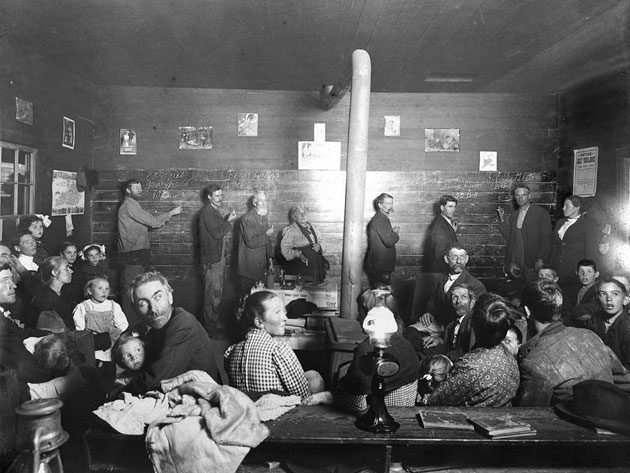
They
were called "moonlight
schools" because the classes were held at night. The idea
was Cora Wilson Stewart's, a Rowan County teacher in 1895 who was
elected superintendent in 1901. Beginning in September 1911, the
turnout surpassed even her wildest expectations: "The came singly
or hurrying in groups," she later explained, "they came
walking for miles, they came carrying babies in arms, they came bent
with age and leaning on canes, they came twelve hundred strong." By
1914 the program had expanded statewide with the endorsement of the
governor. Other states, north and south, followed suit, and by 1920
the "emancipation of adult illiterates" had become a plank
in the platform of both major parties. Like other activists of the
Progressive era, Stewart saw educational reform as a means to social
reform. Extending the literary franchise was a way to broadcast information
-- to promote new standards of thrift, health, and safety -- but
Stewart also hoped to promote a new community spirit, to "whet
the desire for cooperative activity where," as she put it, "individualism
and stagnation had prevailed."
For details, see the relevant entries in the Kentucky Encyclopedia, John E. Kleber, ed. (University Press of Kentucky, 1992) and Yvonne Honeycutt Baldwin, Cora Wilson Stewart and Kentucky's Moonlight Schools: Fighting for Literacy in America (University Press of Kentucky, 2006).
For an estimate of the Moonlight Schools' significance in the wider contemporary context of agricultural demonstration programs, community theater projects, and public health campaigns, see Joseph Kett, The Pursuit of Knowledge Under Difficulties: From Self-Improvement to Adult Education in America, 1750-1990 (Stanford University Press, 1994).
For details, see the relevant entries in the Kentucky Encyclopedia, John E. Kleber, ed. (University Press of Kentucky, 1992) and Yvonne Honeycutt Baldwin, Cora Wilson Stewart and Kentucky's Moonlight Schools: Fighting for Literacy in America (University Press of Kentucky, 2006).
For an estimate of the Moonlight Schools' significance in the wider contemporary context of agricultural demonstration programs, community theater projects, and public health campaigns, see Joseph Kett, The Pursuit of Knowledge Under Difficulties: From Self-Improvement to Adult Education in America, 1750-1990 (Stanford University Press, 1994).